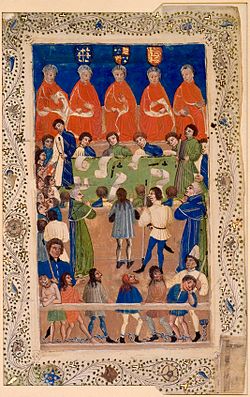
Back Court of King’s Bench German دادگاه مسند قضای پادشاهی (انگلستان) Persian Court of King's Bench Italian

The Court of King's Bench,[a] formally known as The Court of the King Before the King Himself,[a] was a court of common law in the English legal system. Created in the late 12th to early 13th century from the curia regis, the King's Bench initially followed the monarch on his travels. The King's Bench finally joined the Court of Common Pleas and Exchequer of Pleas in Westminster Hall in 1318, making its last travels in 1421. The King's Bench was merged into the High Court of Justice by the Supreme Court of Judicature Act 1873, after which point the King's Bench was a division within the High Court. The King's Bench was staffed by one Chief Justice (now the Lord Chief Justice of England and Wales) and usually three Puisne Justices.
In the 15th and 16th centuries, the King's Bench's jurisdiction and caseload was significantly challenged by the rise of the Court of Chancery and equitable doctrines as one of the two principal common law courts along with the Common Pleas. To recover, the King's Bench undertook a scheme of revolutionary reform, creating less expensive, faster and more versatile types of pleading in the form of bills as opposed to the more traditional writs. Although not immediately stemming the tide, it helped the King's Bench to recover and increase its workload in the long term.
There was a steep decline in business from 1460 to 1540. As the new reforms began to take effect the King's Bench's business was significantly boosted. Between 1560 and 1640, it rose tenfold. The Common Pleas became suspicious of the new developments, as legal fictions such as the Bill of Middlesex damaged its own business. Fighting against the King's Bench in a reactionary and increasingly conservative way, an equilibrium was eventually reached in the 17th century until the merger in 1873.
The King's Bench's jurisdiction initially covered a wide range of criminal matters, any business not claimed by the other courts, and any cases concerning the monarch. Until 1830, the King's Bench acted as a court of appeal for the Exchequer of Pleas and Common Pleas, and required Parliament to sign off on its decisions. From 1585, the Court of Exchequer Chamber served for appeals of King's Bench decisions.
- ^ "Manuscript Collection". Inner Temple Library. Archived from the original on 22 August 2010. Retrieved 26 August 2010.
Cite error: There are <ref group=lower-alpha> tags or {{efn}} templates on this page, but the references will not show without a {{reflist|group=lower-alpha}} template or {{notelist}} template (see the help page).
© MMXXIII Rich X Search. We shall prevail. All rights reserved. Rich X Search